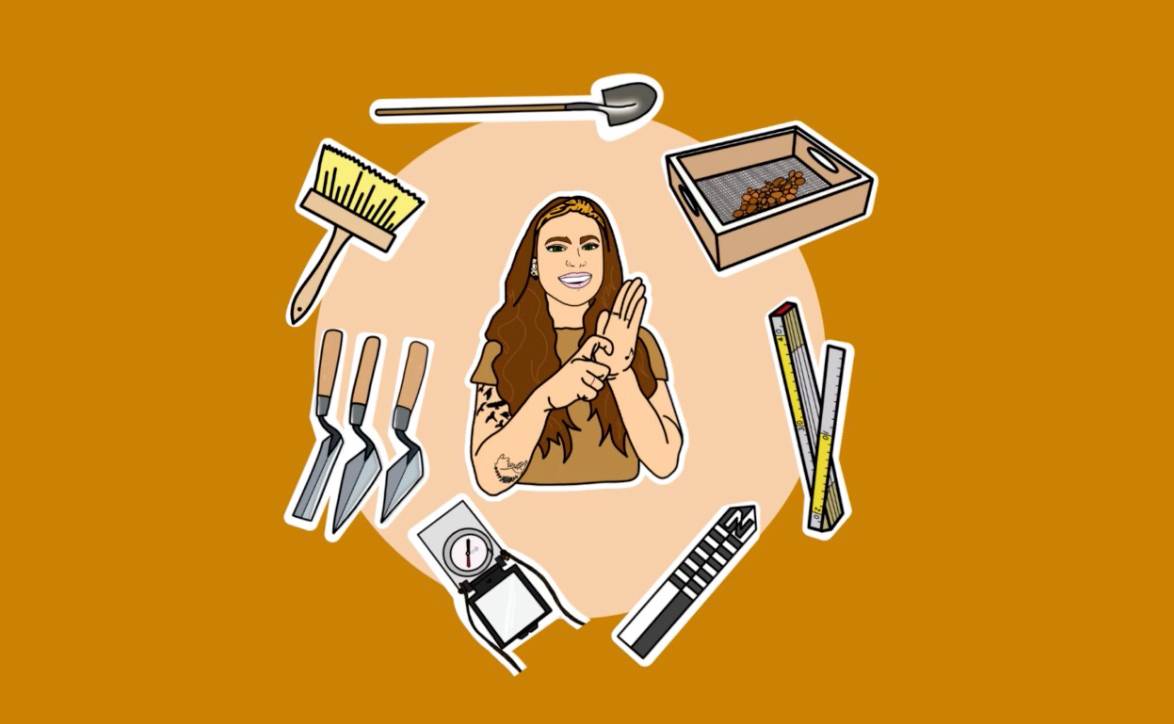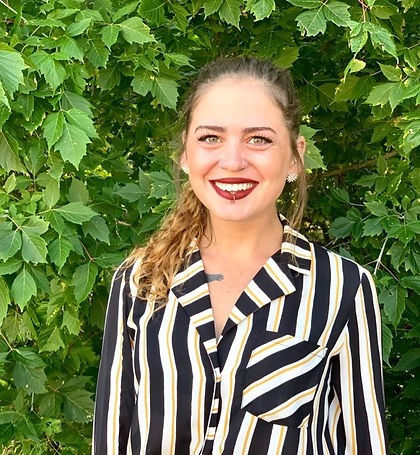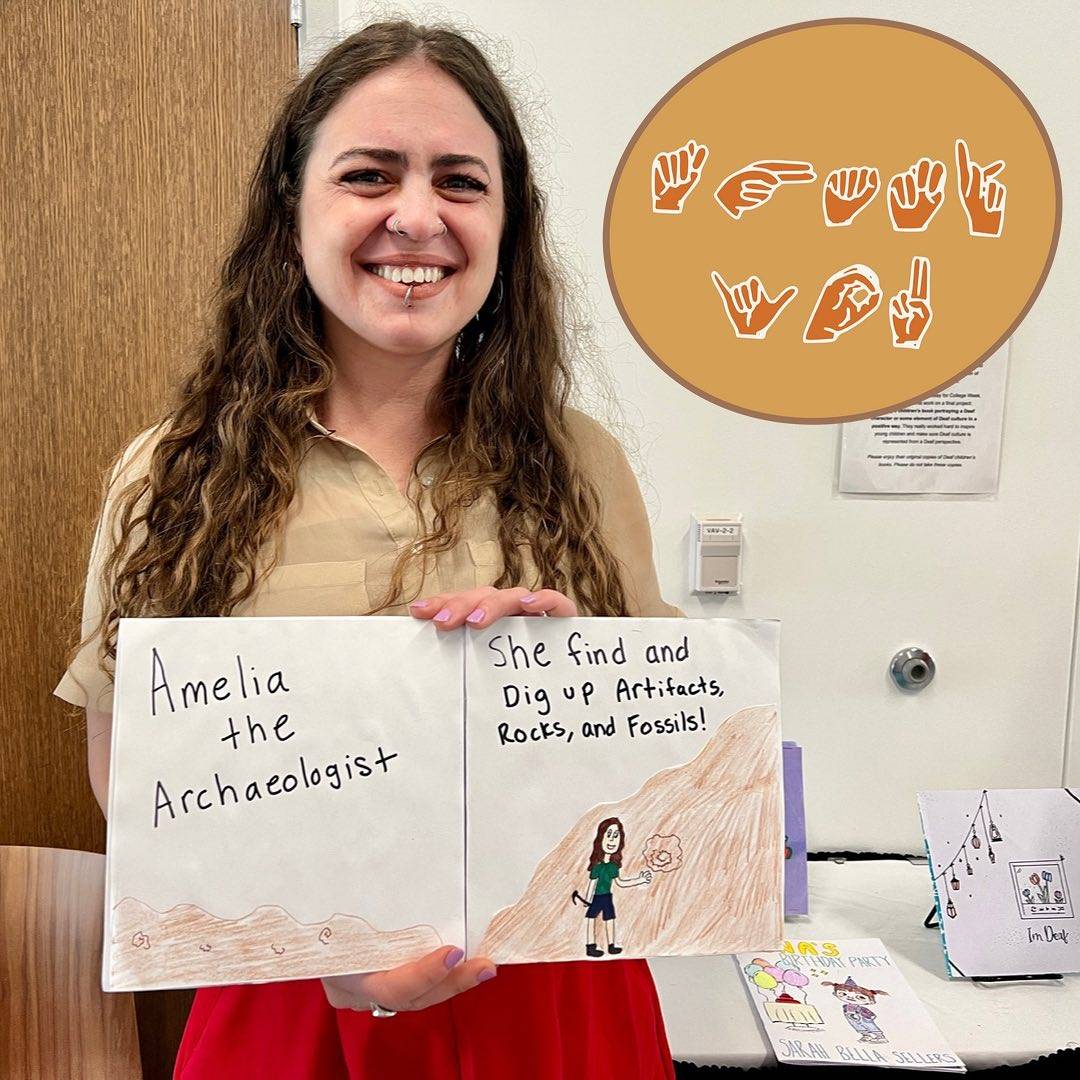As she builds a career in archaeology, TXST alum Amelia Dall brings the deaf community along with her
By Brian Hudgins

Out in the field and in her advocacy efforts, Amelia Dall’s twin passions converge. Deaf since birth, the Bobcat alum has made her way in the field of archaeology since graduating from Texas State University while supporting accessibility for deaf people in archaeology and beyond.

“Unfortunately, there is still a lack of archaeology outreach opportunities or programs for the deaf, youth and adults,” Dall wrote in a recent reflection published on the Archaeology in the Community website. “Programs such as archaeology site tours, volunteer-focused digs, and archaeology lectures are not widely available to the deaf communities due to accessibility. Organizations seem to think we should wait for the interest of deaf communities to develop programs, but I think otherwise. … We should be rolling up our sleeves and providing opportunities regardless.”
Dall, who graduated from Texas State with a master's degree in anthropology (archaeology concentration) in 2017, has created her own opportunities throughout her career. Along the way, she’s committed herself to conducting outreach and providing resources to make the field more accessible for deaf people. Through her website, Amelia the Archaeologist, she provides consulting and translation services, along with an American Sign Language glossary of archaeological terms and other accessibility resources.
A native of Maryland, Dall attended Maryland School for the Deaf. She then earned an art history bachelor’s degree in 2012 from Gallaudet University, a Washington, D.C., school for the deaf and hard of hearing.
Dall credits her late parents — both of whom were deaf and worked for government agencies — with setting an example that her professional passions were well within reach. Meanwhile, her academic studies engaged her fascination with archaeology.
“Going to museums with my mom when I was growing up, I realized how much I loved learning the cultural contexts of artifacts and how they were preserved,” Dall says. “I realized I wanted to work with archaeological collections.”

Texas State provided Dall an opportunity to apply her course work in the field and start developing her career. While in San Marcos, she volunteered for Dr. Ana Juarez, associate professor emerita in the Department of Anthropology, and later worked as a graduate instructional assistant in TXST’s Center for Archaeological Studies. There she gained experience with mapping and Geographic Information Systems.
Dall also worked with Dr. Christina Conlee, who served as Dall’s thesis chair. Dall conducted lithic and ceramic analyses, which enabled her to identify minerals within lithic and ceramic fragments.
“Texas State helped tremendously when I needed to network in the archaeology profession and find employment positions, even with temporary and contracted work,” Dall says. “I am still in touch with my former professors and cohorts.”
Professional advancement did not happen overnight. After graduating, Dall moved to Colorado and landed a job as a museum educator for the Berthoud Historical Society in northern Colorado. She then worked as a weekend visitor services coordinator at the Denver Firefighters Museum.
But she kept her sights on becoming a professional archaeologist. With assistance from Dr. Todd Ahlman, director of TXST’s Center for Archaeological Studies, Dall found an opportunity with an archaeological contract crew during the summer of 2018. Following a handful of other short-term positions, she landed a full-time job two years ago with the Bureau of Land Management’s Royal Gorge Field Office, and this summer she moved into an archaeologist position with the Bureau of Reclamation based in Pueblo, Colorado.
“Amelia’s drive to expand her capabilities and knowledge of archaeological techniques is striking,” Ahlman says. “She sought to learn many different skills and entered the workforce with a broad skillset.”
Dall’s job involves providing government work crews with archaeological input on reducing or eliminating adverse project impacts. She also identifies and recommends heritage resources for potential inclusion in the National Register of Historic Places.
While climbing the career ladder, Dall has maintained close ties to the deaf community. She’s the former chair of the Deaf Culture and History Section of the National Association of the Deaf, and she currently serves on the board of the Colorado Association of the Deaf.
Her efforts with the Colorado group have included leading an inaugural collaboration between the association and Volunteers for Outdoor Colorado to host a volunteer trail restoration project. “It is wonderful having Amelia on the board, and we look forward to her ongoing leadership and accomplishments,” says TraciAnn Hoglind, association secretary.
Dall says most of her coworkers don’t know sign language, and she often finds herself the lone deaf person at work sites. But she’s able to request ASL interpreters for work functions, and she has access to satellite communication in case of an emergency.
Dall says part of her mission is to bring together the archaeological community and ASL interpreting services. She points to her work connecting the Archaeological Institute of America with Trail Blazing Interpreters, a company that specializes in ASL interpretation in outdoors settings.
“I am well involved in the deaf communities nationwide,” Dall says. “I have always advocated for my deaf community members regarding accessibility in archaeology, especially with my website during my off time.”
That work ethic has carried Dall from Maryland to TXST to Colorado — and a rising career in the field of archaeology. “My parents always made sure to motivate me to chase after what I wanted and to ensure I am always learning wherever I go,” Dall says. ★